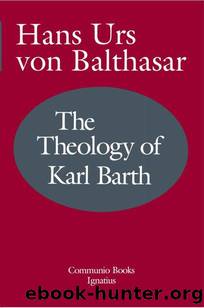The Theology of Karl Barth by von Balthasar Hans Urs

Author:von Balthasar, Hans Urs [Urs, von Balthasar, Hans]
Language: eng
Format: epub
Tags: Spiritual & Religion
ISBN: 9780898703986
Published: 2013-09-08T04:00:00+00:00
Chapter 9
IDEALISM AND REVELATION
Barth has repeatedly stressed that he has not been trying to build any system at all, not even a theological one, that he was simply trying to trace everything back to the mystery of the God made man. Barth is especially insistent on this at the very place where systematization seems to loom the largest, in the doctrine of predestination: âWe cannot gather everything up into a system and look at [this issue] directly. We can only look at it by gazing on the face of the living person Jesus Christ.â1 According to Barth, the biblical narratives are not given to us so that we may submit them to our systematizing; on the contrary, they compel us to contemplate the same scene from continually new starting points (5, 258-59).
If there is no fulcrum point in revelation that one can definitively select and use as the center of gravity around which everything else is ordered, then theology too is forced to think from ever-new perspectives (2, 963-90). Above all, it is impossible âto bring into one system the work of creation and the work of reconciliation as if we were dealing with two pillars of one buildingâ (5, 439).
Let us, then, begin our investigation at this most delicate of points: at the issue of whether there is an inner compulsion in Barthâs theology to become a system.
1. Systematization versus the Existential Moment
The critical point of Barthian thought has always been predestination. Barth himself feels this. A kind of vertigo seizes him when he gazes on the immense light that radiates from this highest of summits overlooking everything else. Should one trust this light? Is not such gazing a presumptuous survey of all, a form of hybris, a Gnosis, a lapse into âphilosophyâ? Should any human being be allowed to eavesdrop on this, Godâs most âprimordial decisionâ (4, 53), this âaboriginal willâ (6,175), this, the most primary of all the words God spoke to himself, in whose âbracketâ everything else takes place (5,123) and in whichâas Barth says with HegelâGod simultaneously goes forth from himself and remains true to himself (ibid.)? Is it really given to man to possess the key to all Godâs works and ways? Was this not the very crime of Prometheus?
Or perhaps it is permitted. Perhaps this is the prerogative of the Christian. And if it is permitted, could it perhaps also be commanded? Perhaps we are called to climb so high that every fall from those heights, every rejection for our hybris, has already been anticipated and allowed for from Godâs very first decision in Jesus Christ, the Crucified One, rejected in our stead. Is it not true that in the whole of Godâs work, God never ceases to governâof course in different ways but never so that his work is deflected or interrupted but moves inexorably toward the goal already determined by God himself (4, 97)? Can we ever interpret Godâs wrath in any other way but as the âshadow side of his
Download
This site does not store any files on its server. We only index and link to content provided by other sites. Please contact the content providers to delete copyright contents if any and email us, we'll remove relevant links or contents immediately.
The Lost Art of Listening by Michael P. Nichols(7506)
Why I Am Not A Calvinist by Dr. Peter S. Ruckman(4153)
The Rosicrucians by Christopher McIntosh(3521)
Wicca: a guide for the solitary practitioner by Scott Cunningham(3179)
Signature in the Cell: DNA and the Evidence for Intelligent Design by Stephen C. Meyer(3138)
Real Sex by Lauren F. Winner(3023)
The Holy Spirit by Billy Graham(2953)
To Light a Sacred Flame by Silver RavenWolf(2823)
The End of Faith by Sam Harris(2742)
The Gnostic Gospels by Pagels Elaine(2531)
Waking Up by Sam Harris(2461)
Nine Parts of Desire by Geraldine Brooks(2369)
Jesus by Paul Johnson(2363)
Devil, The by Almond Philip C(2333)
The God delusion by Richard Dawkins(2309)
Heavens on Earth by Michael Shermer(2284)
Kundalini by Gopi Krishna(2185)
Chosen by God by R. C. Sproul(2164)
The Nature of Consciousness by Rupert Spira(2108)
